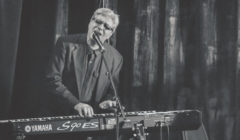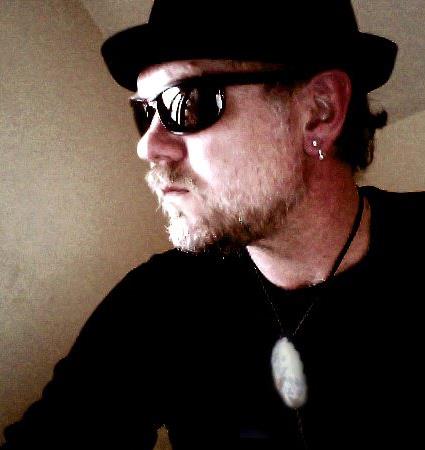A View from the Piano Bench: Rhys Brigida
If you happen to be one of his Facebook friends you probably look forward to the weird cheez-whiz-like-sci-fi super-goofy movie clips that he routinely shares to the collective cyber-giggling-delight of the local online community. If you’re someone who deals with Rhys Brigida from day-to-day, then you know him as an astute, accountable individual you can count on. If you’re a musician or music lover you enjoy flicking your bic at his chops.
I met Rhys while hanging out backstage during a production of Beatle’Cuse several years ago. We were waiting in the wings for our respective soundchecks, chatting with the other musicians, eating snacks and enjoying a few pops throughout the day. By the time the day was done, we were pals and we made plans to jam together, soon. Ever since then we’ve been band mates.
The rest of the city knows Rhys as a stellar musician, extremely capable of piano and keyboard magic in any style. You saw him play with Timepiece, Windsong and the Billionaires over the last few decades. Today, he takes a few moments to visit with us at Table Hopping
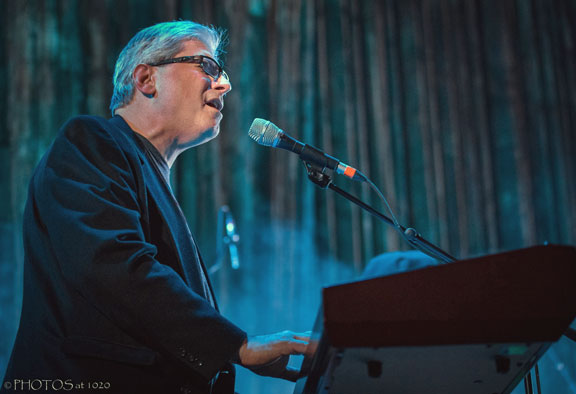
I love all styles of music, and as I went through years of playing, learning and discovery I developed deep respect for any player or singer who showed creativity, style and a command of their instrument(s).
Chuck Schiele: Thanks for chatting with us, Rhys.
Rhys Brigida: My pleasure, Chuck. Thank you.
CS: When did you start playing music? How did you get started?
RB: I starting playing piano at age 6. My parents bought a spinet and I had private lessons every week until I entered middle school. I practiced my scales, learned classical, read/memorized sheet music, did recitals, and pretty much grew up with music always being a major part of my life. I was the only one in the house who played an instrument, but my mother (who never sang professionally) had a strong, pretty voice. She could sing all her favorite hits effortlessly! I thought it was normal hearing her sing every day, and growing with that I took it for granted. In retrospect, I think she may have had considerable talent, but never really pursued using it. I like to think that she passed a little of that to me.
CS: What and who influences you most as a musician?
RB: My appreciation and passion for music didn’t start with piano lessons. I love all styles of music, and as I went through years of playing, learning and discovery I developed deep respect for any player or singer who showed creativity, style and a command of their instrument(s). My earliest childhood
memories are still clear to me – joyfully listening to 45 RPM records on the Sears Silvertone stereo in my
parents living room. Stacks of hit records played on the spindle by Ray Charles, Elvis, The Big Bopper, Connie Francis, Dinah Washington, Bill Haley, The Coasters, and were then flipped over to play side ‘B’. So, as a baby I listened to R&B, Rock & Roll, Blues, and popular artists of the day. The radio was always on in the house. My teen-aged sister carried her transistor radio around to every room, tuned to WOLF 1490 AM. As the 1960’s rolled in, pop music was the soundtrack of my life even though I studied and practiced only classical on the piano. As a kid, I never questioned why learning piano was mainly classical, and listening for fun was always popular music. When I became a teenager myself, things changed quickly for me.
CS: Brief history of your music career.
RB: It’s hard to compress decades into a couple of paragraphs, but I’ll try. As a teen I was already overwhelmed by the enormous diversity of music that happened in the 1960s, and into the next decade I went “electric” with a Hammond portable organ. I had a job through my high school years and saved up to buy a Leslie speaker. Then I learned how to rock on the piano and organ. I met friends who played guitar and drums. Bands formed, and gigged. I met more musicians. When I graduated I entered the music
program at OCC. It was a great experience. This was my first exposure to playing real jazz in a big band. I read charts and learned to improvise. Playing the school’s Fender Rhodes suitcase piano in a jazz rhythm section at the age of 19 was mind-blowing for me. One weekend, in 1975 a couple of guys in the stage band invited me to ride down to the Albany area to see a new band called Return to Forever. They were playing a concert on a school campus in a tiny chapel that seated about 100. We sat up front. I had no clue what was about to happen. I was just a few feet from Chick Corea, Stanley Clarke, Al Di Meola and Lenny White. Those young dudes changed my life, and I understood that if I wanted to play music I had a lot of serious practicing to do!
After some college I took an offer to play music full time. Off we went, playing six nights/week. It lasted a couple of years, made a good living and I have to admit it was great experience. We did mostly covers, but our sets were crafted into little “shows” which made the band a lot more interesting for both us, and the audience.
When I returned home I found day jobs, got married and still played a lot of music in the Syracuse area. One of the first bands I was in locally that worked steady was
Timepiece. The repertoire was strictly 1960s, and we covered bands like the Moody Blues, and Strawberry Alarm Clock. We embraced the music, used technology, made it as authentic as we could, and succeeded by playing most of the local venues in rotation over the course of a few years.

Salt City Chill
As the 1980’s came to an end I formed Windsong, and the Billionaires. These two bands kept me extremely busy, booking over 100 gigs per year. It was nonstop gigging for over 25 years. So much, I needed to slow down and do something different. I began working on smaller musical projects, recording, playing specialized events such as Beatle’Cuse, and this is where I met Chuck Schiele (you know him?). Our work, together with Todd Hobin, Richie Melito, John Dancks and Phil Smith is what we know today as SaltCityChill.
CS: Your thoughts on the CNY music scene:
RB: The part of the local music culture visible to most of us is compact, diverse and mighty! “Visible”, meaning the trendy places where people gather, the advertised events, jams and festivals, etc. I use the word “compact” because although there are hundreds of acts (see the lists of acts nominated for local music awards), the musicians that persevere and work a full calendar in this limelight are relatively few. I say “diverse”, because the bands that seem to play nearly full-time in the public eye cover the blues, rock, reggae, R&B, and a mixture of styles including funk, country and hip-hop. I like to keep in mind that our local culture is what we, as musicians make of it, and we’ve made it good in Syracuse.
Then, there’s another facet of our music culture that needs no publicity, and gets even less. The number of musicians booking gigs with private clients is staggering and the amount of work available is equally impressive. The important point is that there are different ways to succeed and work locally as a musician. You can become a part of the visible musical culture. The other option is to work in the private sector, marketing yourself and your music from a website or your choice of marketing tool to get gigs that are completely hidden from the media radar. I’ve found that it’s best to book gigs in both the private and public areas. You can benefit from doing both, and you’ll have a strong understanding of what’s happening musically where we live.
CS: Memorable highlights of your career.
RB: Some of my fondest memories are about playing music with my bands, sometimes working way more than we should have. We had trouble saying “no” to any offer. I recall with Windsong, it wasn’t unusual for us to play doubles and occasionally a triple! There was one weekend where we played three gigs on a Saturday, including an early municipal concert, an afternoon private party, and then finish off the night with a club gig. After loading up the truck at 3am for the last time, we all looked at each other and talked about what time we needed to meet the next day for that Sunday afternoon concert in the park.
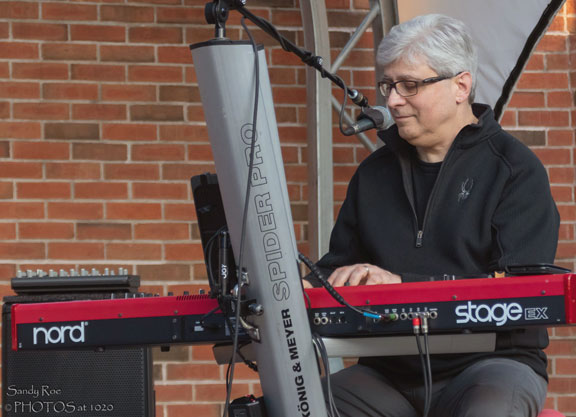
Practice hard. Take lessons. Teach yourself on your own time, but you need someone to mentor you and tell you what you’re doing right and where you are going wrong.
CS: Funny war stories:
RB: Send in the clowns. In my full-time days on the road we did shows, and one of our sets was entitled “Presto the Clown”. The band dressed in full clown costumes, grease-paint, rubber noses, wigs, etc. The music was outrageous, silly, and pretty naughty. Somewhere out in the mid-western USA, we had an afternoon show at a beautiful, 30-story hotel in their top-floor lounge. The elevator ride from the ground floor to the club was lengthy. The band members, in full clown costume were suffering from gastrointestinal issues. Enough said. We reached the top floor and the doors opened. There were guests waiting to ride down, and when they saw us emerge, they laughed. We, as clowns embraced their laughter and proceeded toward the stage. Let’s just say I felt quite sorry for the guests who entered for the long ride down. I turned and watched the elevator doors close. It was like the shutter of a camera, capturing facial expressions that were no longer laughing. Perhaps one’s sense of humor can be adjusted by one or more of the other senses.
CS: Advice for budding musicians.
RB: Practice hard. Take lessons. Teach yourself on your own time, but you need someone to mentor you and tell you what you’re doing right and where you are going wrong. Self-taught players develop bad habits that linger. Don’t limit yourself to one style of music. Listen intently. I was lucky to have great music teachers, and to this day I still use skills they taught me. Try to understand and appreciate the creativity and talent behind all artists. Learn something from every musician you play with and every song you listen to. Take ideas from others and let them inspire you. Create, don’t just copy. Interpret, and express what you learn as yourself, because no one can do it the same as you! As long as you have your health and a mind, never stop playing music. It’s never too late to grow. Challenge yourself to play something slightly above your skill level. Keep trying until you nail it, and that’s how you improve. I just bought a bass guitar. A personal challenge. I’m practicing my scales, and creating parts on the instrument that I may not have thought to play with my left hand on the keyboard. Learn another instrument and think of it as speaking a second language. Music is the universal language.
CS: Who do you listen to, locally, nationally, etc?
RB: I love the original music that is coming out of our local talent. If you play original music, then you know who you are and I follow all of you closely on social media. I’ll mention some national recording artists that took my breath away over the years and helped me to form the thoughts of advice to young players (as above): George Duke, Bill Payne, Marian McPartland, Bill Evans
CS: Near future music plans?
RB: I want to keep writing and recording tunes. Years ago I never really had an outlet for my own musical ideas, but that’s changed in the last few years thanks to you, Chuck. So, let’s start with silence and build something great from there.
I’m also playing in Rochester, NY with a band called Soul of the City. Classy, modern funk and soul, covering artists that need some serious attention and keyboard practice on my part. I’ll keep you posted.
CS: How can we find you and your music?
RB: My e-mail is: rhys_brigida@yahoo.com
SaltCityChill – Syracuse, NY and my Facebook page is: www.facebook.com/rhys.brigida. SaltCityChill’s debut CD is available at local outlets; see the band website, saltcitychill.com. I also have many band videos from various projects on YouTube Rhys Brigida.
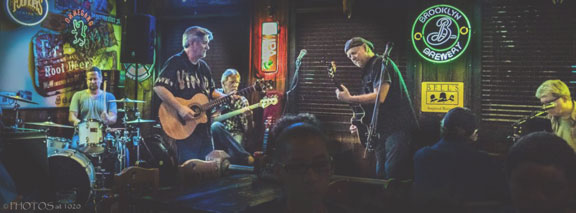
Salt City Chill at the Brooklyn Brewery.

